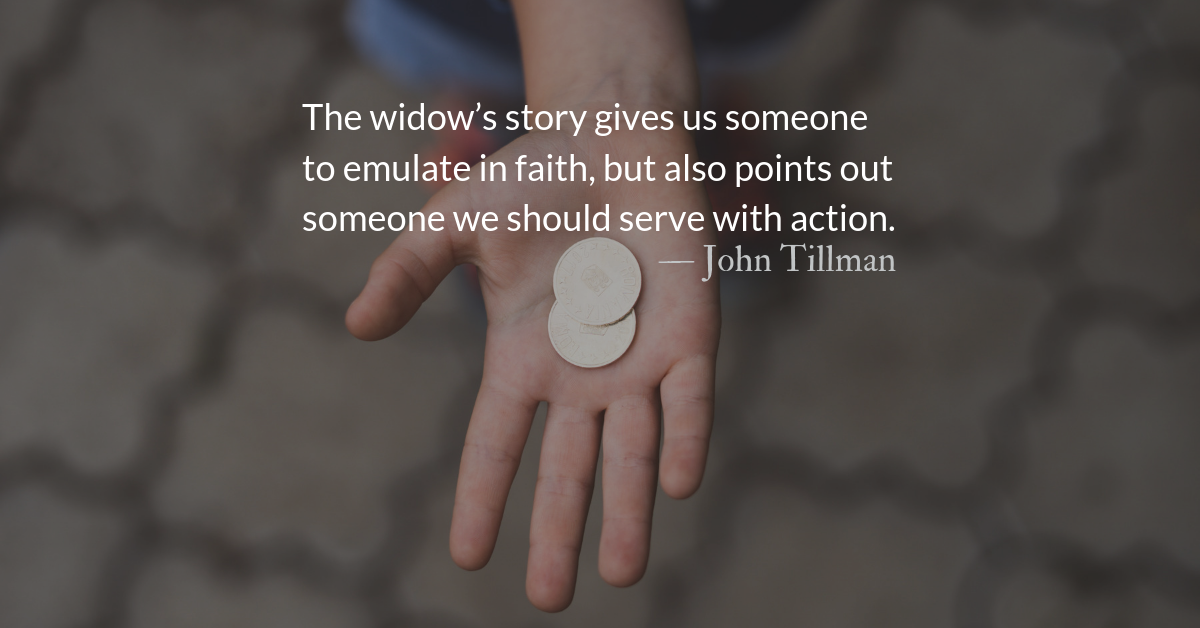Luke 20.47; 21.2-4, 6
They devour widows’ houses and for a show make lengthy prayers. These men will be punished most severely…
He also saw a poor widow put in two very small copper coins. “Truly I tell you,” he said, “this poor widow has put in more than all the others. All these people gave their gifts out of their wealth; but she out of her poverty put in all she had to live on.””…
“As for what you see here, the time will come when not one stone will be left on another; every one of them will be thrown down.”…
Reflection: The Context of The Widow’s Mite
By John Tillman
Many lessons about the widow’s mite focus on how beautiful her faith is.
The widow’s faith is beautiful because it is centered on God, not on an institution that is corrupted by sinful leadership. Her gift is beautiful because it shows how deep her faith goes—all the way down to her last pennies. Her gift is beautiful because it shows where her treasure truly lies.
We should praise the widow’s faith, as Jesus did, but taken in context, this scripture has more to say about unscrupulous religious leaders than about generous poor people. It tells us that judgment is coming on leaders who take advantage of the poor.
In Luke and in Mark, the widow enters in the middle of a scene where Christ is confronting the religious leaders’ materialism and hypocrisy and, just afterward, tells his disciples that the Temple they value so much will be torn down and destroyed.
Luke includes the detail that Jesus “looked up” and saw the widow’s deed in the midst of his teaching. The words just off of his lips are ones of judgement on religious leaders who “devour widows’ houses.” When Jesus points out the widow, he is showing us that his meaning is not metaphorical. The widow’s story gives us someone to emulate in faith, but also points out someone we should serve with action.
Scripture doesn’t tell us what happened to the widow. Some propose that God would miraculously provide for her. If forced to conjecture, I pray that one of Christ’s disciples, being as concerned about the destruction of the widow’s life as about the destruction of the Temple, would take her in. Sometimes miracles are simply disciples taking practical action. (I like to imagine that perhaps it was Mark.)
The bright light of the widow’s faith shines within the darkness of hypocrisy and abuse. What does the Spirit of Christ speak to you in the light of her faith?
Are we like the religious leaders? Are we projecting piety while living extravagantly?
Are we like the rich? Are we giving because it looks good or until we feel good?
Are we like the disciples? Are we over impressed with wealth and success, equating it with God’s favor?
Can we learn to live like the widow? Are we able to live in faith, despite our systematic victimization, despite our poverty, and despite the existence of corruption?
Prayer: The Request for Presence
Let your loving-kindness be my comfort, as you have promised to your servant. Let your compassion come to me, that I may live, for your law is my delight. — Psalm 119.76-77
Today’s Readings
Exodus 19 (Listen – 4:04)
Luke 22 (Listen – 7:58)
This Weekend’s Readings
Exodus 20 (Listen – 3:21), Luke 23 (Listen – 6:39)
Exodus 21 (Listen – 4:44), Luke 24 (Listen – 6:16)
Thank You!
Thank you for reading and a huge thank you to those who donate to our ministry, keeping The Park Forum ad-free and enabling us to continue to produce fresh content. Every year our donors help us produce over 100,000 words of free devotionals. Follow this link to support our readers.
Read more from A Cry to God for the Poor from Zimbabwe :: Worldwide Prayer
It grieves us and must grieve you that so many defenseless people live without shelter, clean water, primary healthcare, education, food. Help us, Lord Jesus, to care and share with the less privileged the material resources you have graciously blessed us with.
Read more about Good News to the Poor
Our manifestation of Christ will be in direct proportion to our acknowledgement of needing him more than we need our comforts, our possessions, our luxuries, or even our daily bread.







